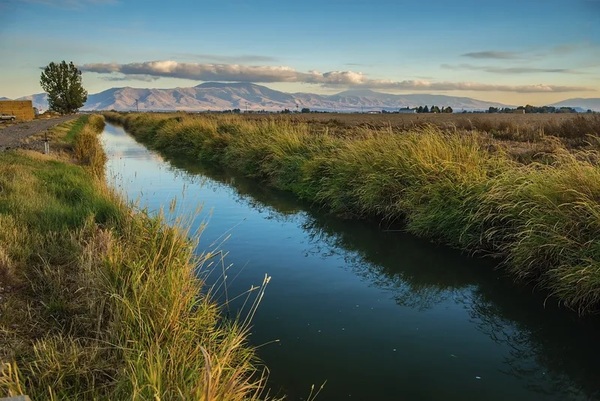
–>
October 14, 2022
California’s agricultural production is as large as Texas and Iowa combined. The state’s Mediterranean climate and fertile valleys help make it the fifth largest supplier of food and fiber in the world. It all depends on water.
‘); googletag.cmd.push(function () { googletag.display(‘div-gpt-ad-1609268089992-0’); }); }
Most of the state’s crops rely on irrigation as opposed to rain. Irrigation is regulated by a system of water rights held by public and private parties. Notice these are “rights” and not “privileges.” The exercise of these rights to bring about beneficial uses of water such as growing food is a complicated area of law and policy.
History proves that giving the government control over the food supply is usually a recipe for famine. Still, there are many environmental and so-called social justice organizations that would like to move all the privately held water rights to state control. One way to do so is by influencing state water rights agencies through Critical Race Theory.
California’s State Water Resources Control Board, (AKA the State Board), has released a draft of its Racial Equity Action Plan and is soliciting public comments. The board is one of the more powerful of California’s bureaucracies. Members are appointed by the governor and according to its website, “…the five-member State Water Board allocates water rights, adjudicates water right disputes, develops statewide water protection plans, establishes water quality standards, and guides the nine Regional Water Quality Control Boards.”
‘); googletag.cmd.push(function () { googletag.display(‘div-gpt-ad-1609270365559-0’); }); }
According to Executive Director Eileen Sobeck, “There could not be a more critical challenge facing us at this time than the challenge of achieving racial equity,” demonstrates the Board’s priorities in this time of major drought.
The word “equity” as used by Sobeck is not synonymous to equality, but reflects the thinking found in Critical Race Theory, which divides people according to their skin color as oppressors or oppressed. CRT is a development of the cultural Marxism originated at the Institute for Social Research (Institut für Sozialforschung), or Frankfurt School, that swaps out race for the economics emphasized in standard Marxist theory.
On November 16th, 2021 the State Board adopted Resolution No. 2021-0050 “Condemning Racism, Xenophobia, Bigotry, and Racial Injustice and Strengthening Commitment to Racial Equity, Diversity, Inclusion, Access, and Anti-Racism.” The resolution cites Black Lives Matter as inspiration and is packed with language like this: “California’s water rights system has been built on racism perpetuated by White Supremacy.”
The resolution goes on: “White supremacy is a systemically and institutionally perpetuated system of exploitation and oppression of nations and peoples of color by white people for the purpose of maintaining and defending a system of wealth, power and privilege.” Citing murders of non-whites by whites, the resolution calls for development of a Racial Equity Action Plan.
This raises questions. Should the State Water Board be drawing inspiration from the largely discredited and openly Marxist Black Lives Matter as a source of policy?
We’re in a drought. The State Board just got slapped by the 6th District Court for overreaching its authority on water rights. The California Auditor has a scathing report on the board’s handling of grant fund accountability. Is racial equity really the critical challenge facing the board?
‘); googletag.cmd.push(function () { googletag.display(‘div-gpt-ad-1609268078422-0’); }); } if (publir_show_ads) { document.write(“
Is the staff of an agency tasked with administrative record keeping equipped to develop a Racial Equity Action Plan? Actually, staff is getting help from GARE — the Government Alliance for Race & Equity based at UC Berkeley according to the resolution.
 At a Racial Equity Action Plan workshop in Visalia, California on July 27, 2022 I was the only mostly white man in attendance and not once did I hear anyone from the public say they had a concern about water and racism. They all had concerns about adequate water supply and the state diverting flows away from the San Joaquin Valley.
At a Racial Equity Action Plan workshop in Visalia, California on July 27, 2022 I was the only mostly white man in attendance and not once did I hear anyone from the public say they had a concern about water and racism. They all had concerns about adequate water supply and the state diverting flows away from the San Joaquin Valley.
One of the attendees said when his parents arrived from Mexico in the 1950s there was plenty of water. His family had the opportunity to work and they saved, bought a home and started a business. The rural communities were not inundated with drugs, gangs, and crime. Now the state continues to cut back water deliveries to farmland in the name of environmentalism. He said crops don’t care about race, water doesn’t care about race, but withholding water from farms hurts all races.
Who is responsible? The draft of the plan states, “The Racial Equity Team aims to bring this plan to the State Water Board as an information item in 2023. The board will not approve or deny the Racial Equity Action Plan. However, staff will update the Board on its implementation periodically.”
Here’s an interpretation of the above statement. The team is not locking themselves down to a specific deadline. The hope is sometime before 2024 they can bring the completed plan to the State Board. It will be an information item and not an action item so the Board members won’t have to make any choices that could embarrass or displease Governor Gavin Newsom. All the Board members have already profusely given their support to this endeavor but they won’t have to sign their name to it with a vote. Staff will update the Board on the plan’s implementation. The draft plan is short on accountability and it will be interesting how staff judges measurable objectives.
The plan has three strategies. One — integrating racial equity and measuring impact.
Programs and policies will be evaluated and realigned to address racial injustices.
Two — creating, maintaining space for inclusion and belonging. Three — activating BIPOC community wisdom and sharing power.
On page 15, “Develop an ongoing community capacity building fund to compensate community partners for their expert wisdom, time and collaboration; provide travel stipends to community members, provide funding to community members to pay for amenities to reduce participation barriers; support community-led projects that address environmental injustices; and support community leadership in water decision making processes.”
During one of the public comment sessions concerning the resolution, Marina Perez, who works in the State Board’s Office of Public Participation, stated she wants the board to pay for environmental justice speakers at conferences. Atley Keller, Local Government Commission located in Sacramento put a finer point on it when she said she wants the board to financially compensate local NGOs. Community Water Center, one of the NGOs that helped develop this plan has already received more than $7.25 million in funding from the board in the form of grants.
When did the board’s mandate change from a bureaucracy administering water rights to an arbitrator and avenger of perceived injustices? At exactly the same moment the people of California stopped holding their government accountable because they thought someone else would do it for them. It gets serious when your family’s food supply can be negatively impacted.
Remember freedom is worth fighting for and if you don’t push back you’re going to get what they give you and you won’t like it. People and organizations are afraid to speak out against this obvious racist tactic of CRT for fear of being called “racist.” So? Racists are calling you a racist. You don’t have to be from California to speak up for food security and there are rumors someone from Sacramento wants to run for national office. Perhaps your voice can be an influence for sanity. Go to Racial Equity Action Plan and let them know your opinion.
Don A. Wright publishes www.WaterWrights.net from California’s Central Valley, a reporting service following agricultural irrigation policy, politics and implementation.
Image: US Gov.
<!– if(page_width_onload <= 479) { document.write("
“); googletag.cmd.push(function() { googletag.display(‘div-gpt-ad-1345489840937-4’); }); } –> If you experience technical problems, please write to [email protected]
FOLLOW US ON
<!–
–>
<!– _qoptions={ qacct:”p-9bKF-NgTuSFM6″ }; ![]() –> <!—-> <!– var addthis_share = { email_template: “new_template” } –>
–> <!—-> <!– var addthis_share = { email_template: “new_template” } –>







